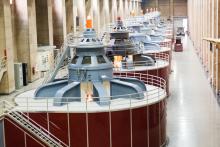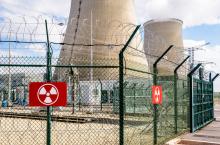Courses
Partnering with other national laboratories, Instructional Systems Design (ISD) at Pacific Northwest National Laboratory offers a diverse range of courses on behalf of our sponsors. Using innovative computer software and educational theories, ISD courses are designed to enhance learning retention and comprehension. Whether it's an online module or an interactive in-person session, ISD delivers captivating national security training to support and strengthen mission objectives.

Border Security
Border security training teaches personnel how to detect and stop the illegal transportation of nuclear materials and weapons across borders. Participants undergo thorough training to recognize suspicious activities, use advanced detection technologies, and collaborate with international agencies to reduce the risks of proliferation. This training is crucial for improving border surveillance and enforcement, ultimately safeguarding global security.

Chemical and Biological Security
Chemical and biological security training provides personnel with the expertise needed to counteract threats from dangerous substances and biological agents. Participants gain an understanding of risk evaluation, decontamination techniques, and the utilization of protective gear. By promoting readiness and cooperation, this training bolsters resilience against chemical and biological emergencies, thereby protecting both public health and national security.

Critical Infrastructure Protection
Critical infrastructure protection training educates personnel on how to defend crucial assets like power plants, transportation systems, and communication networks from both physical and cyber threats. Participants are trained in risk management, threat assessment, and emergency response procedures. By improving resilience and coordination among stakeholders, this training fortifies the defense of vital services and infrastructure, reducing the effects of possible disruptions and guaranteeing uninterrupted operations.

Cyber Information and Computer Security Training
Cyber information and computer security training offers vital knowledge and skills to protect against cyber threats and keep sensitive data safe. Participants delve into topics like encryption, detecting malware, and responding to incidents. By advocating for cybersecurity best practices and raising awareness, this training bolsters defenses against cyber attacks, guaranteeing that digital assets and information systems remain intact, private, and accessible.

Emergency Response
Emergency response training offers ongoing and enhanced instruction to equip individuals and organizations with the necessary skills to effectively implement response protocols. Our courses cover a range of topics, including postal chemical/biological incident management, crisis response training, site response survey, and more.

Explosives Detection and Explosives Breaching
Explosives detection and breaching training teaches people how to find and handle explosive dangers safely. Participants learn to spot explosive materials, use detection tools, and perform controlled breaching when needed. By improving their ability to detect and respond to explosives, this training makes security measures stronger and reduces the risks from explosive incidents, protecting both people and infrastructure.

Fixed Site Nuclear Security
Fixed site nuclear security training is provided through immersive, interactive experiences in real-life scenarios. Partner countries are offered educational opportunities to cultivate the next generation of experts in physical protection.

Security Instructor Training
Security instructor training gets professionals ready to teach others about security rules, procedures, and top methods. People learn how to teach, create lesson plans, and assess students, all focused on security topics. By making sure instructors are skilled and sure of themselves, this training makes sure the right security information gets spread, making groups and communities more watchful and stronger.

Nonproliferation and Arms Control
Nonproliferation and arms control training educates individuals on policies and strategies to prevent the spread of nuclear weapons and regulate conventional arms. Participants learn about international treaties, verification mechanisms, and diplomatic negotiations. By fostering understanding and compliance with nonproliferation agreements, this training promotes global security and stability.

Security Personnel and Protective Force Training
Security personnel and protective force training teaches how to handle emergencies and threats effectively. Participants learn crisis management, communication skills, and tactical procedures. By preparing them to act swiftly and decisively, this training ensures the safety of people and property. It equips security personnel with the knowledge and skills needed to respond confidently to various security incidents.

Transportation Security Training
The transportation security training process involves interactive presentations, hands-on exercises, and a thorough evaluation methodology. This comprehensive approach not only delivers crucial information on transport security to our international partner but also assesses the strength and effectiveness of their transport security measures.

Strategic Trade Management
Strategic trade management training equips professionals with skills to design, implement, and evaluate training programs aligned with organizational goals. Participants learn strategic planning, needs assessment, and performance analysis techniques. By optimizing training resources and aligning initiatives with business objectives, this training enhances workforce capabilities and organizational effectiveness, fostering continuous improvement and sustainable growth.